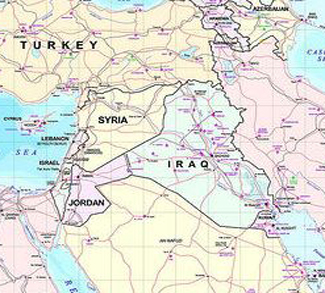FORECAST
In contrast to previous bellicose posturing, Nicaragua’s leftist president offered on Wednesday to mediate talks on behalf of the Revolutionary Armed Forces of Colombia (FARC) in an effort to end Colombia’s 44-year civil conflict. Such a shift in tone underscores FARC’s diminished position and reflects attempts by socialist Latin American governments to mitigate US influence in the region.
Nicaraguan President Daniel Ortega, a former Marxist revolutionary and Cold War adversary of the US, was approached by FARC to discuss a peace process with the US-backed Colombian government and has made overtures to Colombian President Alvaro Uribe. This shift towards a peace process is in contrast to the Andean diplomatic crisis in March 2008 when Nicaragua and its allies, the socialist governments of Venezuela and Ecuador, showed solidarity with FARC by temporarily cutting diplomatic ties with Colombia after the Colombian military raided a rebel camp in Ecuador and killed FARC’s second in command, Raúl Reyes.
Also reflective of Ortega’s shift is FARC’s crumbling position, as evidenced by the deaths of its senior leaders, the large-scale defection of supporters, a lack of funds, and most recently, the rescue of high profile hostages such as French-Colombian politician Ingrid Betancourt. These developments would have been unfathomable just six years ago, when FARC threatened to overrun the right-wing Colombian government.
The changing tides of war are due in large part to Colombia’s US-backing in the form of logistical and intelligence support to the tune of $1.3 billion. Such support has manifested itself in US-Colombian initiatives like ‘Plan Colombia’, which counters narcotics funded leftist opposition groups like FARC via military strikes and aerial fumigation of coco crops in rebel controlled territory. More importantly, ‘Plan Colombia’ serves to secure oil resources, such as the Caño Limón-Coveñas pipeline, by defending them against costly FARC and National Liberation Army (Ejército de Liberación Nacional, ELN) attacks.
This initiative is indicative of the US’ wider policy of hegemonic control of South America, dating back to the Monroe Doctrine of the 19th century and exhibited in the covert activities of the CIA and Special Operations Forces in the 20th and 21st century. A FARC-free Colombia would allow US oil companies like ExxonMobil, ChevronTexaco, and Occidental Petroleum Corporation to increase exploration and extraction under stable conditions. Increased oil production in Colombia would be in line with the Bush administration’s May 2001 National Energy Policy report, which called for the diversification of foreign oil sources in order to reduce reliance on Persian Gulf crude and counter Chinese competition.
A strategic foothold into a stable Colombian oil market, as well as its billion-dollar cocaine industry (first engaged by the CIA to fund the Contras in the 1980s) would also enable the US to curtail the growth of socialist governments led by anti-US Venezuelan President Hugo Chavez’s Bolivarian Revolution.
Cognizant of these high stakes, Ortega follows in the mediation footsteps of Chavez in order to ensure the existence of FARC, his ideological “brothers in arms” and mitigate US influence in the region. As with Chavez, Ortega’s attempts are likely to be rebuffed by a Colombian government flush with a string of successes and US backing. Thus it seems likely that Colombia will continue its campaign to finish off FARC.
Established in 1964 as the military wing of the Colombian Communist Party, FARC’s objectives are to seize power in an armed revolution and enact political, economic, and social reform on behalf of Colombia’s poor and marginalized subsistence farmers.
FARC funds itself through extortion, kidnapping, and the cocaine trade, and has bases covering 20 per cent of Colombia’s territory as well as camps in Venezuela, Ecuador, and Panama. As one of the oldest and largest insurgent groups in the Americas with a current membership of 8000 (down from 16,000 in 2001), FARC has been blacklisted as a terrorist and drug-trafficking organization by Colombia, the US, Canada, and the EU.
SUMMARY OF EVENTS: July 14 – 21, 2008
NORTH AMERICA
United States
As home prices continue to decline and loan defaults mount, U.S. regulators are bracing for dozens of American banks to fail over the next year.
Even as the Bush administration moved to rescue the nation’s largest two mortgage companies, confidence in the banking sector spiraled downward Monday.
President Bush has the legal power to order the indefinite military detentions of civilians captured in the United States, the federal appeals court in Richmond, Va., ruled on Tuesday in a fractured 5-to-4 decision.
Federal Reserve chairman Ben Bernanke said Wednesday ailing Fannie Mae and Freddie Mac are “in no danger of failing,” helping fuel a big boost in the troubled finance sector as fears of a deeper crisis eased.
The United States will announce in the next month that it plans to establish a diplomatic presence in Tehran for the first time in 30 years, a British newspaper said on Thursday.
Mexico
U.S. Border Patrol agent Reynaldo Zuniga was arrested last month lugging a bag of cocaine up from the Rio Grande, one of a growing number of law enforcement officers accused of taking bribes from drug gangs.
WESTERN EUROPE
French President Nicolas Sarkozy and 42 leaders on Sunday launched a union between Europe and its Mediterranean neighbours but tensions among Middle East countries could undermine the grand plan.
Spain
Spain’s supreme court Thursday overturned the guilty verdicts on four of the 21 people convicted over the Madrid train bombings that killed 191 people in 2004.
United Kingdom
MPs are calling for an investigation into allegations that British intelligence has “outsourced” the torture of British citizens to Pakistani security agencies after hearing accounts of people being abducted and subjected to mistreatment and, in some cases, released without charge.
The UK officially ratified the European Union’s Lisbon Treaty by giving the documents to the Italian foreign affairs ministry in Rome.
EASTERN EUROPE
Russia
The Russian ambassador to Britain denied Tuesday claims by London that Moscow has increased its intelligence activity in the U.K.
Russian energy giant Gazprom reserves the right to take Belarus to court if the country fails to pay in full for Russian natural gas supplies, the company said on Wednesday.
Russia has refused to extradite a former Ukrainian security service deputy head suspected of involvement in the poisoning of President Viktor Yushchenko in 2004, Ukraine’s top prosecutors said on Wednesday.
Russian Foreign Minister Sergei Lavrov will visit China on July 21-22 to sign a document delineating a long-disputed border between the two countries, the Foreign Ministry said on Friday.
MIDDLE EAST
Iran
A defense analyst said on Thursday that Iran had apparently doctored photographs of missile test-firings and exaggerated the capabilities of the weapons.
Iran says it has discovered a new oil field containing more than one billion barrels of crude.
Iraq
US President George W. Bush and Iraqi Prime Minister Nuri al-Maliki have agreed to set a “time horizon” for US troop withdrawals as part of a long-term security pact, the White House said Friday.
SOUTH ASIA
Malaysia
Malaysian opposition figure Anwar Ibrahim will be remanded in police custody for a sodomy case, his lawyers said on Wednesday, setting the stage for a political showdown that could alarm foreign investors.
Myanmar
Military-ruled Myanmar has ratified a charter by Southeast Asian nations that aims to create an economic bloc of half a billion people, Singapore’s foreign minister said in remarks published on Friday.
Nepal
Hundreds of protesters calling for independence for Tibet protested in the Nepali capital of Kathmandu on Friday, and police said they took 118 demonstrators into custody for organizing anti-China demonstrations.
AFRICA
Sudan
The International Criminal Court’s (ICC) prosecutor charged Sudan’s president on Monday with masterminding a campaign of genocide in Darfur, killing 35,000 people and persecuting 2.5 million refugees.
Sudanese President Omar Hassan al-Bashir has agreed to restore diplomatic ties with neighboring Chad, broken off in May after a rebel attack on the Sudanese capital Khartoum, mediator Senegal said on Friday.
Zimbabwe
Official figures have shown that Zimbabwe’s annual rate of inflation has surged to 2,200,000%.
European Union countries will agree on Tuesday to widen sanctions on Zimbabwe, including more travel bans and asset freezes on supporters of President Robert Mugabe and measures against companies, diplomats said.
Marsha Reid is a contributor to Geopoliticalmonitor.com



